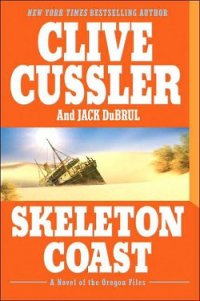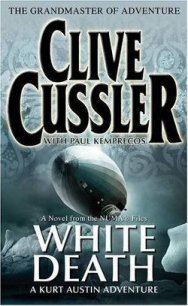Dark Watch - Cussler Clive (книга бесплатный формат .txt) 📗
The chopper banked around the headland, and the Karamita Breakers Yard came into view. More ships of every size and description were moored within the bay like cattle in a chute headed for slaughter. A pair of supertankers, each at least a thousand feet long, had been dragged up the sloping beach by a combination of tidal surges and huge winches. An army of men swarmed over the hulks, tips of glowing flame sparking whenever their cutting torches touched metal. A crane on wide crawler treads sat just at the surf line and plucked steel sections of hull as soon as they were sliced free. It swung them farther up the beach, where even more workers were ready to cut and beat the slabs into manageable chunks. Other teams of men ripped piping and electrical cables from within the ship’s hull, eviscerating the supertanker as though they were dissecting a carcass for consumption
And in a sense they were. The smaller pieces of metal were transferred to railcars for the short journey northward to the Karamita Steel Works. There, the scrap was melted down and remilled into steel reinforcement bars for the never-ending construction boom going on in southern China. Behind the modern steel mill shimmered the artificial lake backed up behind Indonesia’s largest hydroelectric plant, the engine that allowed for such heavy industry in an otherwise inhospitable jungle.
The once pristine sand that ringed the bay had turned into a black, tarry porridge that clung to the men’s feet like clay. Beyond the oil boom the sea was reasonably protected, but inside the floating containment wall, the water was a toxic soup of oil, heavy metals, PCBs, and asbestos. Acres of land had been turned into storage yards littered with ships’ boilers, mounds of lifeboats, an assortment of anchors, and hundreds of other items that could be resold on the open market. Behind the fenced lots rose dozens of drab dorm buildings little better than tenements. A squatters’ camp of prostitutes, con men, and crooks had sprung up along the rail line to drain the workers of the few pennies a day they earned turning retired ships into scrap.
Savich noted that the forest behind the facility was slowly receding as thousands of workers cut the trees for their cooking fires. While the air was free of pollution because the mill ten miles north ran on hydro rather than coal or oil, an industrial pall hung over the breaker’s yard, the miasma of its own corruption and filth.
But there was one modern element to the process, and this was doubtlessly what Shere Singh wanted Savich to see. On the far side of the tankers was a gleaming corrugated metal building nearly as large as the ships, with dozens of translucent panels on the tin roof to provide light within. Two-thirds of the eight-hundred-foot building was constructed out over the water on large pilings. Four sets of train tracks met the inland side, and as the chopper thundered over the facility Savich saw two pairs of small diesel engines haul a five-foot-long portion of a ship out of the building. He recognized the curve of the hull, the thick keel, and could see interior passages as though peering into a cut-away model. No, he thought, it reminded him of a slice taken from a loaf of bread. The cuts were straight, and the metal shone silvery in the tropical light. He couldn’t fathom how something as large as a ship could be carved so perfectly.
The helicopter pad was several miles from the breaker’s yard, protected from the din and smell by another promontory of naked rock. Around it were tended lawns and breezy bungalows for the supervisors, clerks, and skilled workers. An open jeep was waiting next to the landing zone, the driver standing by to help Savich with his luggage. The Russian had no desire to stay in Indonesia longer than necessary, so all he carried was a briefcase and a battered leather grip. The bulk of his luggage was in an airport locker. He allowed the driver to put the bag in the back of the jeep but kept the calfskin case on his lap as they drove toward the breaker’s yard.
It took a few moments for his hearing to return after an hour’s flight in the helo, and when it did, his ears were assaulted by the racket of pneumatic cutting chisels, spade-like jackhammers, and the piercing throb of countless generators. The crane dropped a ten-ton slab of metal onto the beach with a dull thump, and seconds later men were hacking at it with sledgehammers and handheld electrical saws designed to cut steel. They wore little more than rags, and Savich could see their legs, chests, and arms were covered with dark scars from contact with hot, sharp metal. He saw more than one missing an eye, fingers, or part of a foot.
And then from the enclosed building came an unholy shriek that cut the air like a diamond being cleaved. It rose in pitch until Savich thought his head would shatter and continued on for a minute, then two. The driver offered him a pair of ear protectors, and he gratefully snugged them over his head. The noise was still there but low enough now that his eyes cleared of tears. To his amazement, the workers continued their tasks as though the screaming wasn’t even there, and the driver seemed equally unfazed.
The jeep stopped outside the large warehouse structure just as the sound came to an abrupt end. Savich hadn’t realized he’d held his breath. He let it out with a grateful whoosh and motioned to the driver if it was okay to remove the plastic and foam protectors. The Indonesian nodded.
“I am sorry,” he said formally in English. “We are used to it.”
“What was that?” Savich asked.
“The ship saw,” he said and motioned Savich over to an exterior scaffold elevator that ran up the side of the ten-story building.
The driver handed Savich over to another worker. He was given a plastic hard hat with ear protectors that could be snapped into place. The worker slammed the elevator door closed, pressed a button, and waited patiently as the lift ascended the building. While not as impressive as the view flying in, Savich was amazed by the scale of Singh’s operation. It looked as though the next ship to meet its fate after the rusting tankers had been rendered was a small white cruise ship that looked like a virgin bride amid a group of indigent hookers. A square hole had already been cut in her side, and a floating crane was transferring the vessel’s desalinization unit to a waiting lighter.
The elevator reached the top, and the worker slid open two sets of doors. Savich recoiled at the stench of burned metal. When his eyes adjusted to the gloomy interior and he’d blinked away the effects of the fumes, he saw that the building was one huge open space with massive doors at both ends. Despite the size, it felt cramped because a large ship took up most of the volume. Or what was left of the ship.
The catwalk where they stood was almost directly in line with her bridge. Before being admitted into the shed, workers had cut away the ship’s funnel and masts so she could fit inside. Nearly half the vessel had been lopped off, a neat line as though a giant guillotine had cut her clean. Large winches at the front of the building strained to drag the carcass up the inclined floor. Once in position, a mechanism on an overhead track lowered from the ceiling and tightened what looked like a large chain around the entire hull. Savich looked more closely. The chain was embedded with metal teeth like a flexible band saw.
“What do you think, my friend?” Savich’s host called from the bridge of the derelict freighter.
Like all Sikhs, Shere Singh wore a long beard that covered the lower portion of his face that he tucked into his tightly wound turban. The hard hat perched precariously atop the white cloth looked like a child’s toy helmet. His hair and beard were streaked with silver and discolored around his mouth from years of heavy smoking. His skin was nut brown and weathered, and he had intense, almost maniacal hazel eyes with a disconcerting tendency to stare unblinking. Singh was also at least six inches taller than Savich’s five ten, with a barrel chest, shoulders as wide as a gallows’ arm, and a heavy gut as solid as oak.




